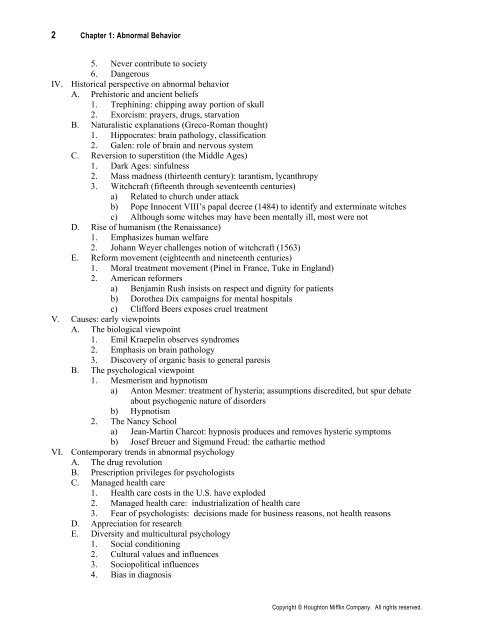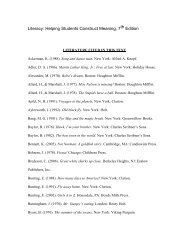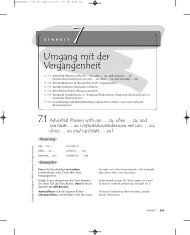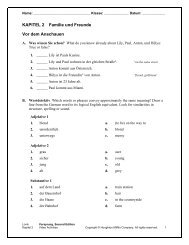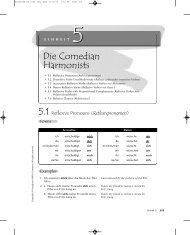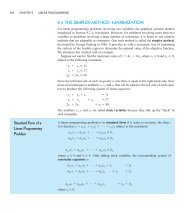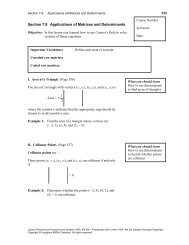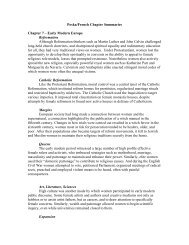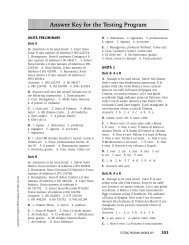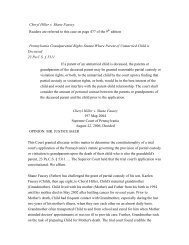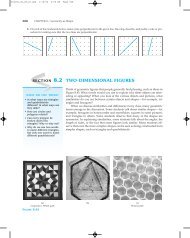- Page 1 and 2: Instructor’s Resource Manual Unde
- Page 3: Contents PREFACE...................
- Page 6 and 7: vi Preface Video Resources An annot
- Page 8 and 9: The Case of Steven V. A NOTE ABOUT
- Page 10 and 11: x The Case of Steven V. THE CASE OF
- Page 12 and 13: xii The Case of Steven V. During th
- Page 14 and 15: xiv The Case of Steven V. the mothe
- Page 16 and 17: xvi The Case of Steven V. depressio
- Page 18 and 19: xviii The Case of Steven V. Steve
- Page 20 and 21: xx The Case of Steven V. As I look
- Page 22 and 23: xxii The Case of Steven V. angry at
- Page 24 and 25: xxiv The Case of Steven V. Steve: Y
- Page 26 and 27: xxvi The Case of Steven V. This sys
- Page 29: CHAPTER 1 Abnormal Behavior CHAPTER
- Page 33 and 34: Copyright © Houghton Mifflin Compa
- Page 35 and 36: Copyright © Houghton Mifflin Compa
- Page 37 and 38: Copyright © Houghton Mifflin Compa
- Page 39 and 40: Copyright © Houghton Mifflin Compa
- Page 41 and 42: Copyright © Houghton Mifflin Compa
- Page 43 and 44: Copyright © Houghton Mifflin Compa
- Page 45 and 46: CHAPTER 2 Models of Abnormal Behavi
- Page 47 and 48: Copyright © Houghton Mifflin Compa
- Page 49 and 50: Copyright © Houghton Mifflin Compa
- Page 51 and 52: Copyright © Houghton Mifflin Compa
- Page 53 and 54: Copyright © Houghton Mifflin Compa
- Page 55 and 56: Copyright © Houghton Mifflin Compa
- Page 57 and 58: Copyright © Houghton Mifflin Compa
- Page 59 and 60: Copyright © Houghton Mifflin Compa
- Page 61 and 62: Copyright © Houghton Mifflin Compa
- Page 63 and 64: CHAPTER 3 Assessment and Classifica
- Page 65 and 66: Copyright © Houghton Mifflin Compa
- Page 67 and 68: Copyright © Houghton Mifflin Compa
- Page 69 and 70: Copyright © Houghton Mifflin Compa
- Page 71 and 72: Copyright © Houghton Mifflin Compa
- Page 73 and 74: Copyright © Houghton Mifflin Compa
- Page 75 and 76: Copyright © Houghton Mifflin Compa
- Page 77 and 78: Copyright © Houghton Mifflin Compa
- Page 79 and 80: Copyright © Houghton Mifflin Compa
- Page 81 and 82:
Copyright © Houghton Mifflin Compa
- Page 83 and 84:
Copyright © Houghton Mifflin Compa
- Page 85 and 86:
Copyright © Houghton Mifflin Compa
- Page 87 and 88:
Copyright © Houghton Mifflin Compa
- Page 89 and 90:
Copyright © Houghton Mifflin Compa
- Page 91 and 92:
Copyright © Houghton Mifflin Compa
- Page 93 and 94:
Copyright © Houghton Mifflin Compa
- Page 95 and 96:
Copyright © Houghton Mifflin Compa
- Page 97 and 98:
Copyright © Houghton Mifflin Compa
- Page 99 and 100:
Copyright © Houghton Mifflin Compa
- Page 101 and 102:
Copyright © Houghton Mifflin Compa
- Page 103 and 104:
Copyright © Houghton Mifflin Compa
- Page 105 and 106:
Copyright © Houghton Mifflin Compa
- Page 107 and 108:
Copyright © Houghton Mifflin Compa
- Page 109 and 110:
11. When my stomach is upset, I wor
- Page 111 and 112:
Copyright © Houghton Mifflin Compa
- Page 113 and 114:
Copyright © Houghton Mifflin Compa
- Page 115 and 116:
CHAPTER 6 Dissociative Disorders an
- Page 117 and 118:
Copyright © Houghton Mifflin Compa
- Page 119 and 120:
Copyright © Houghton Mifflin Compa
- Page 121 and 122:
Copyright © Houghton Mifflin Compa
- Page 123 and 124:
Copyright © Houghton Mifflin Compa
- Page 125 and 126:
Copyright © Houghton Mifflin Compa
- Page 127 and 128:
Copyright © Houghton Mifflin Compa
- Page 129 and 130:
Copyright © Houghton Mifflin Compa
- Page 131 and 132:
Copyright © Houghton Mifflin Compa
- Page 133 and 134:
Copyright © Houghton Mifflin Compa
- Page 135 and 136:
Copyright © Houghton Mifflin Compa
- Page 137 and 138:
Copyright © Houghton Mifflin Compa
- Page 139 and 140:
Copyright © Houghton Mifflin Compa
- Page 141 and 142:
Copyright © Houghton Mifflin Compa
- Page 143 and 144:
Copyright © Houghton Mifflin Compa
- Page 145 and 146:
Copyright © Houghton Mifflin Compa
- Page 147 and 148:
CHAPTER 8 Personality Disorders and
- Page 149 and 150:
Copyright © Houghton Mifflin Compa
- Page 151 and 152:
Copyright © Houghton Mifflin Compa
- Page 153 and 154:
Copyright © Houghton Mifflin Compa
- Page 155 and 156:
Copyright © Houghton Mifflin Compa
- Page 157 and 158:
Copyright © Houghton Mifflin Compa
- Page 159 and 160:
Copyright © Houghton Mifflin Compa
- Page 161 and 162:
Copyright © Houghton Mifflin Compa
- Page 163 and 164:
Copyright © Houghton Mifflin Compa
- Page 165 and 166:
Copyright © Houghton Mifflin Compa
- Page 167 and 168:
Copyright © Houghton Mifflin Compa
- Page 169 and 170:
Copyright © Houghton Mifflin Compa
- Page 171 and 172:
Copyright © Houghton Mifflin Compa
- Page 173 and 174:
Copyright © Houghton Mifflin Compa
- Page 175 and 176:
Copyright © Houghton Mifflin Compa
- Page 177 and 178:
Copyright © Houghton Mifflin Compa
- Page 179 and 180:
Copyright © Houghton Mifflin Compa
- Page 181 and 182:
Copyright © Houghton Mifflin Compa
- Page 183 and 184:
Copyright © Houghton Mifflin Compa
- Page 185 and 186:
Copyright © Houghton Mifflin Compa
- Page 187 and 188:
Copyright © Houghton Mifflin Compa
- Page 189 and 190:
Copyright © Houghton Mifflin Compa
- Page 191 and 192:
Copyright © Houghton Mifflin Compa
- Page 193 and 194:
Copyright © Houghton Mifflin Compa
- Page 195 and 196:
HANDOUT FOR DEMONSTRATION 5: SEXUAL
- Page 197 and 198:
Copyright © Houghton Mifflin Compa
- Page 199 and 200:
Copyright © Houghton Mifflin Compa
- Page 201 and 202:
Copyright © Houghton Mifflin Compa
- Page 203 and 204:
Copyright © Houghton Mifflin Compa
- Page 205 and 206:
Copyright © Houghton Mifflin Compa
- Page 207 and 208:
Copyright © Houghton Mifflin Compa
- Page 209 and 210:
Copyright © Houghton Mifflin Compa
- Page 211 and 212:
Copyright © Houghton Mifflin Compa
- Page 213 and 214:
________ 30. Talking about philosop
- Page 215 and 216:
8. Do you feel inadequate, like a f
- Page 217 and 218:
Copyright © Houghton Mifflin Compa
- Page 219 and 220:
Copyright © Houghton Mifflin Compa
- Page 221 and 222:
Copyright © Houghton Mifflin Compa
- Page 223 and 224:
Copyright © Houghton Mifflin Compa
- Page 225 and 226:
Copyright © Houghton Mifflin Compa
- Page 227 and 228:
Copyright © Houghton Mifflin Compa
- Page 229 and 230:
HANDOUT FOR DEMONSTRATION 3: THE RE
- Page 231 and 232:
Copyright © Houghton Mifflin Compa
- Page 233 and 234:
Copyright © Houghton Mifflin Compa
- Page 235 and 236:
CHAPTER 13 Schizophrenia: Diagnosis
- Page 237 and 238:
Copyright © Houghton Mifflin Compa
- Page 239 and 240:
Copyright © Houghton Mifflin Compa
- Page 241 and 242:
Copyright © Houghton Mifflin Compa
- Page 243 and 244:
Copyright © Houghton Mifflin Compa
- Page 245 and 246:
Copyright © Houghton Mifflin Compa
- Page 247 and 248:
Copyright © Houghton Mifflin Compa
- Page 249 and 250:
Copyright © Houghton Mifflin Compa
- Page 251 and 252:
Copyright © Houghton Mifflin Compa
- Page 253 and 254:
Copyright © Houghton Mifflin Compa
- Page 255 and 256:
Copyright © Houghton Mifflin Compa
- Page 257 and 258:
Copyright © Houghton Mifflin Compa
- Page 259 and 260:
Copyright © Houghton Mifflin Compa
- Page 261 and 262:
Potential drawbacks 1. 2. 3. Copyri
- Page 263 and 264:
Copyright © Houghton Mifflin Compa
- Page 265 and 266:
CHAPTER 14 Cognitive Disorders CHAP
- Page 267 and 268:
Copyright © Houghton Mifflin Compa
- Page 269 and 270:
Copyright © Houghton Mifflin Compa
- Page 271 and 272:
Copyright © Houghton Mifflin Compa
- Page 273 and 274:
Copyright © Houghton Mifflin Compa
- Page 275 and 276:
Copyright © Houghton Mifflin Compa
- Page 277 and 278:
Copyright © Houghton Mifflin Compa
- Page 279 and 280:
Copyright © Houghton Mifflin Compa
- Page 281 and 282:
Copyright © Houghton Mifflin Compa
- Page 283 and 284:
Copyright © Houghton Mifflin Compa
- Page 285 and 286:
Copyright © Houghton Mifflin Compa
- Page 287 and 288:
Copyright © Houghton Mifflin Compa
- Page 289 and 290:
Copyright © Houghton Mifflin Compa
- Page 291 and 292:
Copyright © Houghton Mifflin Compa
- Page 293 and 294:
Copyright © Houghton Mifflin Compa
- Page 295 and 296:
Copyright © Houghton Mifflin Compa
- Page 297 and 298:
Copyright © Houghton Mifflin Compa
- Page 299 and 300:
Copyright © Houghton Mifflin Compa
- Page 301 and 302:
Copyright © Houghton Mifflin Compa
- Page 303 and 304:
Copyright © Houghton Mifflin Compa
- Page 305 and 306:
Copyright © Houghton Mifflin Compa
- Page 307 and 308:
Copyright © Houghton Mifflin Compa
- Page 309 and 310:
Copyright © Houghton Mifflin Compa
- Page 311 and 312:
Copyright © Houghton Mifflin Compa
- Page 313 and 314:
Copyright © Houghton Mifflin Compa
- Page 315 and 316:
Copyright © Houghton Mifflin Compa
- Page 317 and 318:
Copyright © Houghton Mifflin Compa
- Page 319 and 320:
Copyright © Houghton Mifflin Compa
- Page 321 and 322:
Copyright © Houghton Mifflin Compa
- Page 323 and 324:
Copyright © Houghton Mifflin Compa
- Page 325 and 326:
CHAPTER 18 Legal and Ethical Issues
- Page 327 and 328:
Copyright © Houghton Mifflin Compa
- Page 329 and 330:
Copyright © Houghton Mifflin Compa
- Page 331 and 332:
Copyright © Houghton Mifflin Compa
- Page 333 and 334:
Copyright © Houghton Mifflin Compa
- Page 335 and 336:
Copyright © Houghton Mifflin Compa
- Page 337 and 338:
Copyright © Houghton Mifflin Compa


